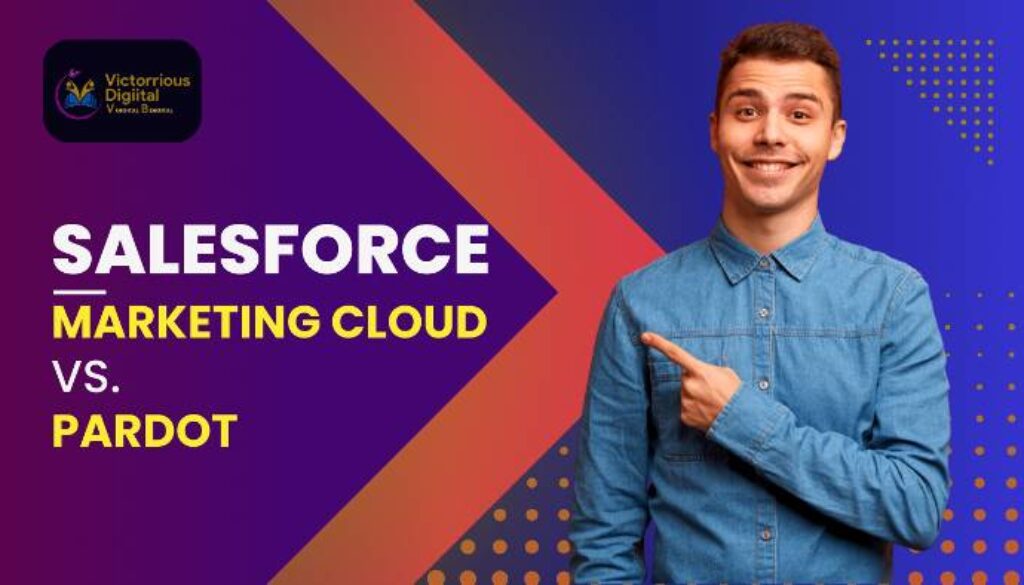Salesforce Marketing Cloude vs Pardot
When choosing a Salesforce marketing tool, you may wonder, “What’s the difference between Salesforce Marketing Cloud and Pardot?” Both tools help businesses connect with customers, but they have different features and are suited for different types of marketing.
In this blog, we’ll look at what each tool does, how they differ, and which one might be right for you. This guide is for beginners and covers all you need to know about these tools. If you’re interested in learning more, there are excellent Salesforce Marketing Cloud training institutes in Pune to dive deeper into these tools.
Table of Contents
What is Salesforce Marketing Cloud?
Salesforce Marketing Cloud is a marketing platform designed to help businesses engage with a large number of customers across various channels like email, social media, SMS, and ads.
With Marketing Cloud, you can:
- Create personalized campaigns.
- Reach customers on multiple channels.
- Automate and schedule your marketing activities.
Key Features of Salesforce Marketing Cloud:
- Email Studio – Design and send custom emails.
- Social Studio – Manage and publish on social media platforms.
- Mobile Studio – Reach customers through text messages.
- Advertising Studio – Create targeted ads that connect to your customer data.
- Journey Builder – Automate the journey for each customer, from welcome messages to follow-ups.
What is Pardot?
Pardot is a Salesforce tool for business-to-business (B2B) marketing. It’s designed for companies that sell to other companies rather than directly to consumers. Pardot focuses on helping sales teams find and nurture “leads”—people or companies interested in their product or service.
Pardot is great for businesses with longer sales cycles, where building a relationship with potential clients over time is important.
Key Features of Pardot:
- Email Marketing – Send targeted emails to potential clients.
- Lead Scoring and Grading – Rate leads based on their level of interest.
- Engagement Studio – Guide leads through a custom journey, from awareness to purchase.
- Lead Nurturing – Build relationships over time.
- ROI Reporting – Track campaign success and measure return on investment.
Example: If your business sells specialized software to companies, Pardot can help you email potential clients, track what they’re interested in, and know when they’re ready to talk to your sales team.
Who Should Use Salesforce Marketing Cloud?
Marketing Cloud is ideal for business-to-consumer (B2C) companies that sell directly to individual customers. It’s especially useful for businesses like:
- Retail Stores – Sending promotions to customers.
- Restaurants – Running social media ads and promotions.
- E-commerce – Understanding customer preferences and behavior.
Marketing Cloud is designed for companies that need to:
- Reach large audiences.
- Use multiple platforms for marketing.
- Send automated, personalized messages to customers.
Tip: Consider online Salesforce Marketing Cloud training to get a strong understanding of this tool.
Who Should Use Pardot?
Pardot is built for business-to-business (B2B) companies, meaning companies that sell to other businesses. It works best for industries with long sales cycles where clients need time and information to make a purchase. Ideal businesses for Pardot include:
- Software Companies – Nurturing leads who need to learn about the product.
- Consulting Firms – Building relationships over time with potential clients.
- Manufacturers – Reaching out to other businesses interested in their products.
If your sales process involves building relationships and nurturing leads, Pardot is a great tool.
For beginners or those who want to improve their skills, there are Salesforce training institutes in Pune and online training options covering both Marketing Cloud and Pardot.
Comparing Key Features of Marketing Cloud and Pardot
| Feature | Salesforce Marketing Cloud | Pardot |
| Target Audience | B2C (business-to-consumer) | B2B (business-to-business) |
| Best For | Large, multi-channel campaigns | Lead nurturing and sales alignment |
| Channels Supported | Email, social media, SMS, ads | Primarily email with focused engagement |
| Main Tools | Journey Builder, Email Studio, Social Studio | Lead Scoring, Engagement Studio |
| Sales Cycle | Shorter, often quick transactions | Longer, relationship-based |
| Reporting Focus | Campaign reach, customer behavior | Lead progress, conversion tracking |
Advantages of Using Marketing Cloud
- Reach Customers on Multiple Channels – Email, SMS, social media, and ads.
- High Personalization – Tailor campaigns to each customer.
- Automated Marketing – Run campaigns that work on their own.
- Analytics and Insights – Understand customer behavior.
Example: A retail store can use Marketing Cloud to promote a new product with email, social media, and SMS, all in one campaign.
Also Read – Guide to Marketing Cloud Journey Builder
Advantages of Using Pardot
- Lead Tracking and Scoring – Know which leads are most interesting.
- Lead Nurturing – Build relationships until a lead is ready to buy.
- Sales and Marketing Alignment – Keep sales teams updated on lead status.
- Return on Investment Tracking – Measure campaign success with detailed reports.
Example: A B2B software company can use Pardot to track which business clients are interested in their services and send them valuable information over time.
Which Tool is Right for You?
Use Marketing Cloud if: You need to reach a large audience quickly and use multiple platforms like social media, email, and SMS to connect with your customers. This is ideal for B2C companies such as retail and hospitality.
Use Pardot if: You work in B2B marketing, where the sales cycle is longer and you need to nurture leads over time. This is ideal for industries like software, consulting, and manufacturing.
Getting Started with Salesforce Marketing Cloud or Pardot
Both Marketing Cloud and Pardot can feel overwhelming at first, but training can help you get the hang of these powerful tools. For beginners or advanced users, there are Salesforce Marketing Cloud classes in Pune as well as some online Salesforce Marketing Cloud courses that cover all you need to know.
These classes will teach you to:
- Create campaigns in Marketing Cloud.
- Track and manage leads in Pardot.
- Use data to improve your marketing results.
With the right training, you can feel confident using either Marketing Cloud or Pardot for your business.
Conclusion
Salesforce Marketing Cloud and Pardot each have unique features and strengths. While Marketing Cloud is best for businesses needing broad customer reach and multi-channel campaigns, Pardot is the right choice for B2B businesses focused on lead nurturing and relationship-building.
Choosing the right tool depends on your business goals and customer type. For those interested in learning more, there are some best Salesforce Marketing Cloud training institutes in Pune as well as some online Salesforce Marketing Cloud courses options to help you get started. Whether you’re working with Marketing Cloud or Pardot, these tools can bring powerful results to your marketing efforts.




